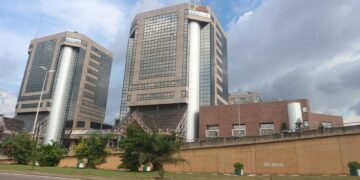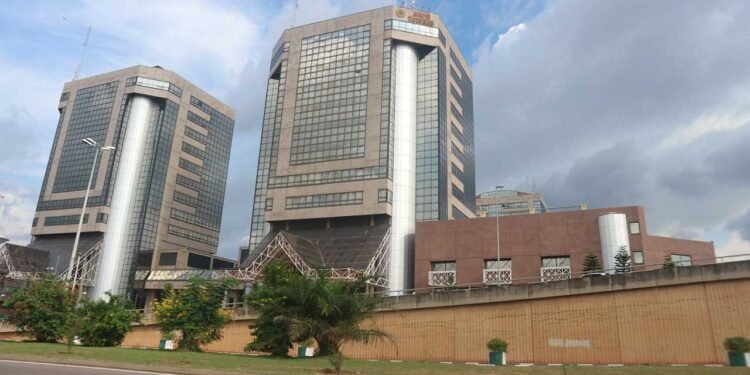Although exact figures and terms of reference remain a secret as transparency and accountability concerns cloud the Direct Sale Direct Purchase (DSDP) arrangement of the Nigerian National Petroleum Company Limited (NNPCL), there are indications that Nigeria may have swapped over 364.5 million barrels of crude oil worth $25.9 billion in the last three years and four months.
Experts, yesterday in a series of interviews, called for an audit into the swap deal and the over N13.9 trillion directly spent on fuel subsidies by the administration of former president, Muhammadu Buhari, through the NNPC.
Buhari, who doubled as President and Minister of Petroleum Resources, had dropped the idea of involving private marketers in the import of petrol, following a backlog of issues inherited under former President, Goodluck Jonathan’s era, where cronies and shrewd business persons allegedly got allocations and foreign exchange to import.
The development made NNPCL, then referred to as the ‘last resort’ to import fuel and record the expenses as under-recovery.
Reportedly, with debt to oil trade running into about $3 billion and dilapidated refineries, NNPCL had allegedly gone back to the swap deal to save its image and dodge a bad credit rating while ensuring that energy security is guaranteed.
On the oil swap, especially under the current management of NNPCL, the first phase of the contract started in 2019 and ended in September 2020, the second phase ended in September 2021 and the third phase by arrangement should have terminated by September 2022.
Instead of a bid round, the second phase saw the extension of the programme two times and more than 300,000 barrels per day (bpd) was provided to the 15 company pairings.
The second bid round saw the selection of 16 pairing companies. Each was to be given 20,000 barrels of crude per day to bring the daily allocation to 320,000 barrels.
With the revelation by NNPC that the scheme was terminated four months ago, there are indications that the DSDP, especially under the current management of NNPCL, lasted for three years and four months. That is about 1, 215 days.
In 2019/2020, the oil price averaged $41 per barrel. At an average of 300,000 barrels daily, this means that the 109,500,000 barrels exchanged for the year should be worth $4.4 billion. In 2020/2021, when oil price averaged $71 per barrel, the 109,500,000 barrels exchanged should be worth about $7.7billion.
In 2021/2022, when oil price averaged $100 per barrel, the yearly exchange should be worth $10.9 billion, while the last four months should be worth $2.9billion.
With the country producing low volumes of crude compared to production, there are indications that most of the contractors are owed crude, which the state oil companies may still continue to pay even after terminating the deal.
While the deal started at a time when NNPC joined Extractive Industries Transparency Initiative (EITI) as supporting company, which mandated the organisation to become much more transparent, stakeholders said the DSDP arrangement remained a secret and raised serious concerns on accountability and transparency.
The national oil company is equally being challenged to clarify the relationship between the oil swap deal and funding being provided for fuel subsidy as the volume of crude, the equivalent products, the premium, insurance and other details are only known to the NNPC.
The Guardian had approached NNPC to clarify the DSDP and subsidy issues, especially the terms of the contract, volumes and the premiums, but the company did not respond even as most of the contracts happened before the firm transitioned to a limited liability organisation.
The first phase included, BpOil International Ltd./Aym Shafa Ltd.; Vitol SA/Calson- Hyson; Totsa total oiltrading SA/Total Nig. Plc.; Gunvor International B.V./AY Maikifi oil and gas Co. Ltd.; Trafigura Pte Ltd./ A.A. Rain Nig Ltd.; Cepsa S.A.U./ Oando plc.; MocohSA/Mocoh Nig. Ltd.; Litasco SA/Brittania- U Nigeria Ltd./ Freepoint Commodities; Mrs. Oil and Gas Company Ltd.; Sahara Energy Resource Ltd.; Bono Energy Ltd./ EternaPlc/ Arkleen oil and gas Ltd./ Amazon energy; Matrix Energy Ltd./ Petratlantic energy Ltd./ Utm offshore Ltd./ Levene Energy Development Ltd.;, Mercuria Energy Trading SA/Barbedos Oil and Gas services Ltd./ Rainoil Ltd./ Petrogas Energy; Asian oil and Gas Pte Ltd./ Eyrie Energy Ltd./ Masters Energy oil and gas Ltd/Casiva Ltd and Duke Oil Company Incorporated.
While the first phase was allegedly extended, another bid round brought onboard 16 consortiums, which are Totsa/Total Nigeria; Oando/Cepsa, AY Maikifi/Britannia-U/Emadeb/Hyde,Trafigura/AA Rano, Litasco/PV Oil/Overbrook/Northwest; MRS Oil; Sahara Energy; Bono/Century/Amazon/Cordero, Eyrie/Levene/Bovas/DK Global; Mercuria/Barbedos/Rainoil/Petrogas; Asian/Masters/Casiva/Cimarron; Duke Oil (NNPC subsidiary); Prudent/UTM/Matrix/Petra Atlantic; BP/AYM Shafa, Vitol and Mocoh/Panero/Stopgap/Mainland.
Due to the inability to run its refineries, NNPC over the years started exchanging parts of its daily 440,000bpd allocation, which should have been meant for the local refineries with traders, who lift crude and in turn give NNPC products such as petrol, diesel and kerosene.
While some of the contractors had in 2021, imported high sulphur products into the country, leaving the market in crisis, from the days of the crude-oil-for-refined-product exchange agreement (RPEA) and to Offshore for Processing Agreement (OPA) to current DSDP being wind down, stakeholders insisted that the move was enriching a few persons and short-changing, a development propelling the call for auditing and investigation into the process.
Reportedly, NNPC had channeled $35 billion to swap deals between 2010 and 2014 (estimated value of 352 million barrels), while unbalanced OPA terms led to $381 million in three provisions of one contract in a year (or $16.09 per barrel of oil) even as NEITI said Nigeria “lost over $723 million (about N221.5 billion at N306.3 to US$1) through the OPA arrangement.
Amidst tax evasion allegation against some of the companies that were at loggerheads with the National Assembly, in 2011, Trafigura and Duke Oil had allegedly lifted $24 billion worth of crude oil (12 million metric tonnes by Trafigura and 33.7 million metric tonnes by Duke Oil) out of the country before formal contracts were signed.
It was reported that the contracts for the lifting, which started in 2011 was signed in December 2014.
Oil and gas governance expert, Dauda Garuba, said both companies “still had $228.5m worth of refined products outstanding to be delivered to the country under the swap arrangement as at the time of the investigation by the House of Representatives in 2016.”
He said the DSDP swap arrangement emerged from public criticisms of the RPEA and OPA swap schemes, which concluded on a note they were not an efficient use of Nigeria’s oil, especially when compared to their unbalanced terms and corruption risks.
Garuba said to make DSDP less susceptible to abuses, different studies, including NEITI and Natural Resource Governance Institutes (NRGI) had recommended the outright cancellation of the swap policy (particularly the unfairly negotiated 2014 and 2015 OPA contracts with SIR, Sahara Energy and Aiteo) and thus recommended a modification of RPEA for use with provisions for competitive bids and strong contract terms.
Indeed, the most popular position was that the daily delivery of the entire 445,000 barrels as Domestic Crude Allocation (DCA) be discontinued and limited solely to the absolvable capacity of the refineries, while the balance crude should be sold with the proceeds used to buy products directly from the international market.
With the alleged sleaze in the arrangement, former President, Society of Petroleum Engineers (SPE), Joseph Nwakwe, believes that auditing of the year-long deal and the subsidy regime would not produce any meaningful outcome.
“Though they may be necessary in certain situations. They are usually expensive with doubtful outcomes,” he said. According to him, there is a need to be deliberate and detailed in designing processes to ensure they are abuse proof and less prone to corruption, with inbuilt self-adjusting mechanisms.
Energy expert and former legal advisor at Shell Nigeria, Madaki Ameh, called for an audit of the DSDP programme, which he said has been, shrouded in opaqueness.
“Many informed players in the industry have questioned whether there is any subsidy at all, considering that as conceived, the DSDP programme is a barter scenario where crude oil is exchanged for the equivalent products in PMS, thereby eliminating the need for any cash payments.
A full audit of the exercise, which started in 2017 will be quite revealing and enrich the current discourse on the subsidy quagmire,” he added.
An expert in energy economics at the University of Ibadan, Prof. Adeola Adenikinju, said while NEITI had raised issues about corrupt practices under the swap arrangements, allegations that equivalent products were either undelivered or under delivered amid criticism that the bidding process were worrisome.
He noted that full liberalisation of the process would remove the problems associated with the DSDP arrangement.
“While I support investigating the process, the immediate issue, in my view, is how to get the new arrangement working and iberalise the process of importing and licensing domestic refineries,” Adenikinju suggested.
Former President of the Chartered Institute of Bankers of Nigeria (CIBN) and professor of Economics at Babcock University, Segun Ajibola, said the protracted challenge of accountability in most public sector initiatives in this country, clouded the DSDP as always been the fear of inaccurate records of transactions in joint ventures between Multinational Oil Companies (MOCs) and the NNPC.
According to him, though the multinationals are good with records, they may not help to promote transparency in DSDP dealings with Nigeria as they are after profit.
“One can only hope that someday, NNPC will be able to pass the litmus test of accountability that will enable Nigeria to rely on its technical competence and monitoring apparatus in such dealings.
According to the Centre for Transparency Advocacy (CTA), the DSDP has foisted corruption and a lack of accountability on the system. It insisted that an audit is required to uncover irregularities and confirm compliance with best practices in the interest of the public.
Executive Director of CTA, Faith Nwadishi, said the civil society organisation had requested for the details of DSDP contracts from NNPC, but the request resulted in unproductive interactions and denial of information.
“The absence of cooperation underscores the need for an exhaustive audit to hold responsible parties accountable. Transparency, information accessibility, and collaboration with civil society organisations are essential.
Audits of the DSDP and subsidy scheme are necessary for exposing corruption and fostering openness,” Nwadishi, former Board Member at global body of EITI, said.
She added that the withdrawal of subsidies by the new administration necessitates scrutiny, particularly with the introduction and management of palliatives, adding that the audit of the subsidy system would cast light on its allocation and use.
“Urgent action is required to initiate an independent audit, restore public confidence, and serve the Nigerian people’s best interests,” Nwadishi added.
NEITI had stated that from 2005 to 2021, the country spent $74.3862 billion, translating to N13.697 trillion on importing PMS alone. Additionally, N10.5 trillion was budgeted for 2022 and the first five months of 2023 as NNPC revealed that the government owes it N2.8 trillion.
NEITI said subsidy payment in 2015 was N316 billion, N99 billion in 2016, N141.63 billion in 2017, N722.30 billion in 2018, N578.07 billion in2019, 134 billion in 2020 and N1.4 trillion in 2021, which is about N3.4 trillion in addition to the N10.5 trillion between 2022 and 2023. The total in about eight years stands at N13.9 trillion.







